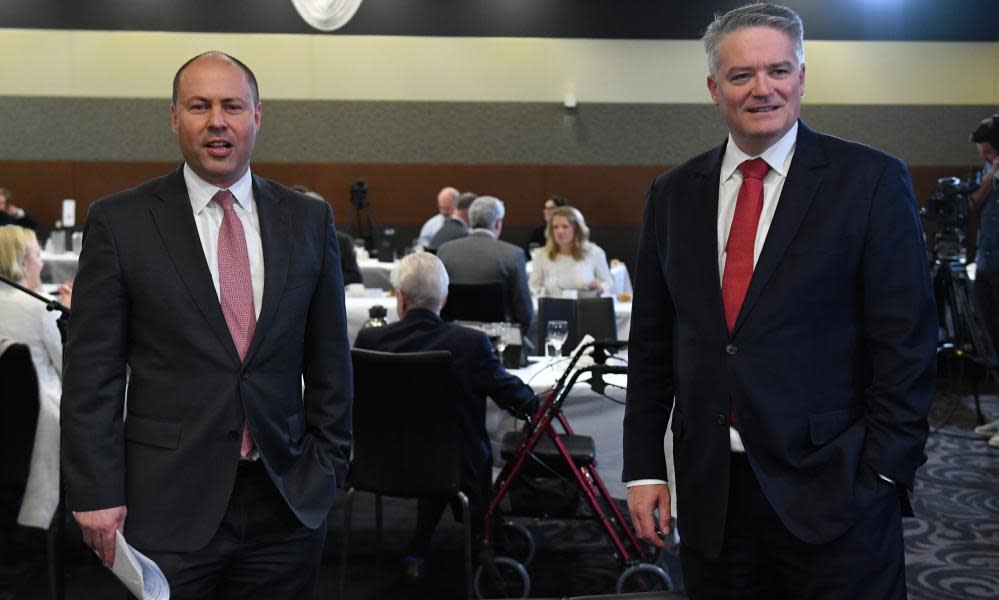Australian retailers urge government to broaden employers' power to cut workers' hours

Australia’s retailers are calling on the Morrison government to broaden the power of employers to cut workers’ hours and change duties, as Labor signalled it will oppose the move to extend flexibility linked to the jobkeeper wage subsidy.
The National Retail Association chief executive, Dominique Lamb, told Guardian Australia the government should consider granting all businesses the flexibility to vary work hours – not just the firms in receipt of the jobkeeper wage subsidy.
As well as extending flexibility, she said the government should also ease eligibility requirements so employers with transient workforces don’t miss out on wage subsidies.
The government has intensified its push for flexibility in workplace regulations, arguing employers need that flexibility to keep their businesses viable because the current trajectory of the coronavirus is uncertain, and having the power to vary conditions will help businesses recover once the immediate crisis has passed.
Related: Weekly cut of $150 to jobseeker coronavirus supplement will throw 370,000 Australians into poverty
The treasurer, Josh Frydenberg, used an outing at the National Press Club on Friday to press the case. He said the current recipients of jobkeeper needed to be able to exercise discretion with their staff through to next March even if they were found not to be eligible for the payment once businesses are reexamined in October.
Frydenberg said all the businesses that had drawn on jobkeeper during the crisis had “been through a distressed period and they will still be struggling to get back on their feet while no vaccine is around”. He said legislation to that effect would be introduced when parliament resumes in August.
The treasurer confined his remarks on Friday to that cohort, but he signalled more would be needed in industrial relations reform. He said the temporary changes had demonstrated “how big an impact a more flexible system can have”.
“There is no doubt that our industrial relations system is overly complex and rigid and for the system to deliver more jobs, it will need to evolve to meet the jobs challenge the country faces.”
With the government upping its ask, Labor is digging its heels in. The opposition objects to the proposal that employers would retain flexibility even when they no longer qualified for jobkeeper.
Labor’s industrial relations spokesman, Tony Burke, told reporters in Sydney the government’s position represented a “direct attack on job security” and was unnecessary because employers can always change conditions by agreement with their workforce.
Burke said when the government first introduced the industrial relations flexibility its rationale was “the Australian taxpayer was effectively subsidising the wage”.
“Now the government is saying that where there is no wage subsidy … the flexibility … doesn’t have to be done by agreement, [allowing] a cutting of hours, a slashing of conditions, shifting a full-timer to part-time,” he said.
But Lamb told Guardian Australia that “no matter what size your business, a lot of people are hurting” and the ability to reduce shift length was an important way to manage labour costs and the risk of unemployment.
Asked if all employers should be able to vary shift length, Lamb replied: “I encourage the government to apply industrial relations flexibility broadly – any relief that can be provided is important.
“Certain industries got temporary flexibility through award changes but it’s become apparent the pandemic is affecting more and more industries, so additional flexibility in the Fair Work Act and awards would be very helpful.”
Jobkeeper will be extended from its scheduled expiry in September to 28 March, although the rate will fall from $1,500 a fortnight to $1,200 then $1,000 in a phased withdrawal, with lower rates to apply for people working less than 20 hours a week in February.
Although the payment is open to new businesses with the required revenue downturn, workers must have been employed on 1 March, prompting concern workforce turnover will leave employers with fewer eligible employees.
Lamb said that “jobkeeper doesn’t apply to new staff” meaning that industries including retail and hospitality with more transient workforces “can’t access subsidies to support their workers”.
“That causes problems for businesses that are trying to move forward and reopen.”
Related: Companies receiving jobkeeper have laid off more than 700,000 excluded workers
On Friday the acting industrial relations minister, Mathias Cormann, poured cold water on the possibility of extending flexibility to all businesses, telling Guardian Australia the government is considering doing so only “on a temporary basis as part of the continuation of the jobkeeper program”.
“Those legislative amendments have never been intended to be permanent and no one is proposing that now,” he said.
Cormann noted that industrial relations roundtables on enterprise bargaining, award complexity, casual employment, greenfields projects and compliance and enforcement are occurring in separate talks between unions and employer groups.
On Friday, Scott Morrison was also asked about employers who might fall through the cracks because they could not show the requisite downturn in both the June and September quarters, such as car-sellers who had a bump in June sales.
Morrison replied that jobkeeper “is intended to be there for businesses who have had a sustained fall in revenues over Covid-19” and the Australian eligibility test is more generous than other jurisdictions.
He noted the taxation commissioner has discretion to allow employers onto the scheme despite “distortions” or “unusual events in the [revenue] data”.
“I also stress that the existing rate of jobkeeper will continue until the end of September – so that is still several months away.
“We want businesses to be able to graduate out of jobkeeper … not for them to be able to remain permanently dependent on jobkeeper.”

 Yahoo News
Yahoo News 
